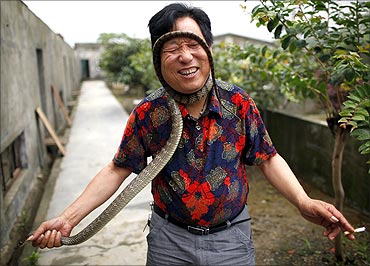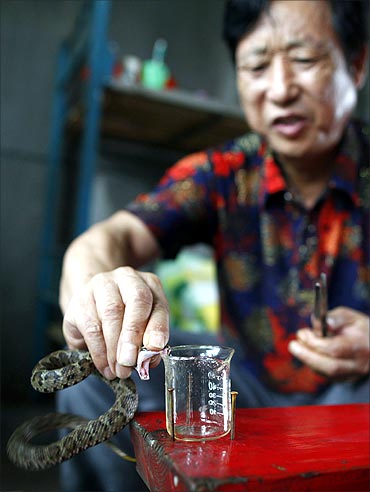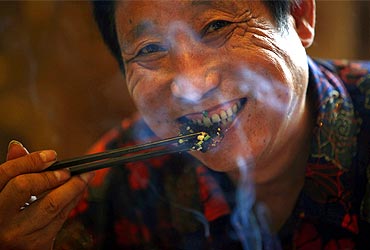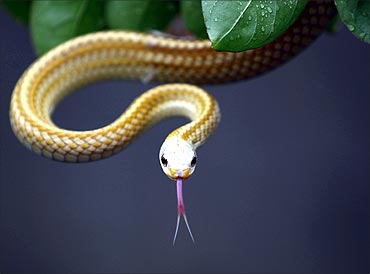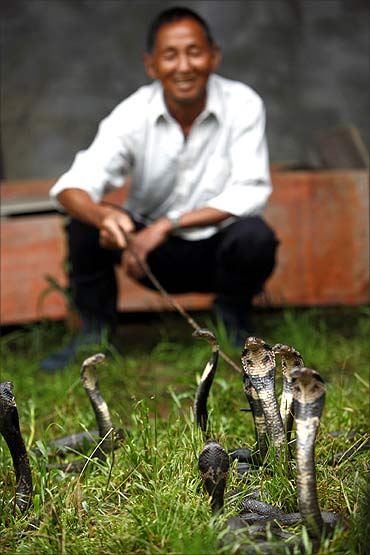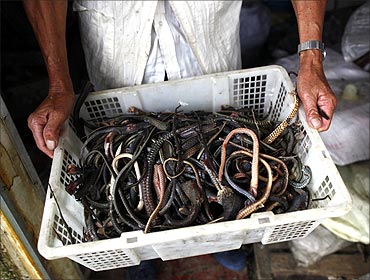This article was first published 14 years ago
Snake trade: How China mints money
Last updated on: June 17, 2011 15:41 IST
Image: Yang Hongchang, owner of a snake rearing company holds a snake at a snake farm in Zisiqiao village.
Photographs: Aly Song/Reuters.
The Chinese love snakes and they mint a ton money in snake trade. Their love for reptiles has grown so much that many species of snakes are facing extinction in China. Snakes have been used for food and medicine for centuries here.
Thousands of tonnes of snakes are sold in restaurants across China.
Residents of Zisiqiao Village, also known as the snake town, raise over 3 million snakes a year for food and medicinal puroposes.
. . .
Image: Yang Hongchang, boss of the snake rearing company extracts venom from a snake.
Photographs: Aly Song/Reuters.
Vipers and cobras are the most-wanted after as their venom is highly sought after for Chinese medicine. More than 700 different types of snake products are found in Chinese markets.
"The global trade in snakes is an industry of considerable socio-economic importance for rural populations in several Asian countries," says John Scanlon, Secretary-General of the Convention on International Trade in Endangered Species of Wild Fauna and Flora (CITES).
CITES is the main international tool to regulate effectively international snake trade in many of these species.
. . .
Image: Yang Hongchang, boss of a snake rearing company eats a snake at a restaurant in Zisiqiao village.
Photographs: Aly Song/Reuters.
Snakes are also sold as pets. Their skin is used in expensive luxury leather goods and accessories.
Many wild snakes are traded internationally for the production of traditional medicine, leather and other products.
The wildlife protection laws are not enforced in most parts of the country, endangering several species of reptiles.
. . .
Image: Yang Hongchang, boss of the snake rearing company holds snakes at the snake farm in Zisiqiao.
Photographs: Aly Song/Reuters.
According to a wildlife trade policy review conducted in Viet Nam, the income from snake breeding is three to five times higher than the income generated by vegetable and crop cultivation, and several dozen times higher than the income from pig and cattle breeding.
. . .
Image: A snake farm in Zisiqiao village.
Photographs: Aly Song/Reuters.
"The harvesting of snakes, and in some cases the initial processing of their skins and other body parts, contributes important revenue to local communities in China and neighbouring countries," Su Chunyu, Executive Director General of the CITES Management Authority of China, explains.
"The Chinese government pays great attention to achieving a harmonious balance between conservation and sustainable use of Asian snakes," he added.
. . .
Image: A resident squats next to cobras at a snake farm in Zisiqiao village.
Photographs: Aly Song/Reuters.
Asia's snakes have reared in large numbers for the skin trade since the early part of the 20th century.
. . .
Image: A resident holds tails of snakes at a snake farm in Zisiqiao village.
Photographs: Aly Song/Reuters.
Snakes play a vital role within their ecosystems.
If snakes disappear from the rice fields or other crop-producing landscapes of Asia, their prey (rodents) could have devastating effects on agricultural production, food security and national economies, according to a CITES release.
